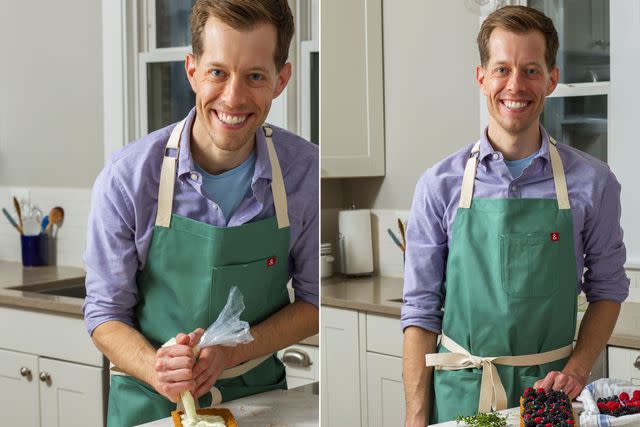5 Things I Learned From Competing on 'The Great American Baking Show'
Being nice and focusing on your strengths will get you far on this show.

Mark Bourdillon / The Roky Channel
When I was selected to compete on the most recent season of The Great American Baking Show, streaming on The Roku Channel, I had no idea what to expect. As a fan of both the American and British versions of the show, I was awe-struck, even before I got there.
We filmed in the iconic white Baking Show tent in England for judges Paul Hollywood and Prue Leith. Walking into the tent for the first episode felt like I had stepped into my television. I’d seen this set so many times, but now it was quiet, without that lovely music by Tom Howe playing in the background. Then I spotted the bench set up with the ingredients for me. When I looked over and saw what other bakers had on their benches, I was a bit intimidated. We didn’t meet the hosts or judges until the cameras started rolling, and out they came. I tried to take several deep breaths through the huge grin on my face. Then the hosts uttered the magic words and I had to focus somehow — what happened next was up to me. It was incredible to compete, and to win my season of the show. Here’s what the experience in the tent taught me.
It's practically an endurance sport
Being a contestant on The Great American Baking Show was a mental and physical feat. Baking anything for four and half hours nonstop requires athletic endurance — I admire every single professional baker and cook out there. Conceptualizing and planning your bakes takes creativity, problem-solving, strategy, and lots of math. The time constraints for each challenge are so tight that the bakers have to move as fast as possible, while staying accurate every step of the way. You must be very coordinated. Try frantically baking macarons in ninety minutes with almost zero instructions, then suddenly Kimmy Schmidt herself, Ellie Kemper, comes to talk to you. (After that challenge, I had no clue what I said to her.)
Filming days start very early and are long. They leave you physically, mentally, and emotionally drained. But then you have to wake up and do it all again — and again and again if you're lucky. But like sports, it's also incredibly exciting, exhilarating, and rewarding, which is what I remember most. It was one of the most challenging and most fun things I’ve ever done.
Baking in the tent is not like baking at home
We get used to baking our own kitchens. We know if our ovens have hot spots, how quickly a lemon curd cooks in our usual pot, and what medium heat feels like on our stoves. If you’re like me, you cram your drawers full of tools but still know exactly where everything lives. You move around your own kitchen without thinking. (Until you bump into your spouse.)
But on the show, you are baking in a new kitchen where you don’t know where anything is stored, plus there are cameras, hosts, judges, and Mother Nature adding wind and scorching heat to make it interesting. Before I left my home in Chicago, I prepared for the show by trying my best to mimic the set-up I saw on TV. I blocked off some of my kitchen counter space so that I didn't spread out too much. My husband would come and ask me to explain what I was doing as I cooked. I did some washing up as I baked to allow for the times when the judges visit and the hosts interrupt. But that didn’t really prepare me to bake in this foreign environment. Grabbing a tool went from a reflex move to a minutes-long hunt. The ovens, freezers, and refrigerators in the tent are not the same as I have at home, so I had to account for those differences — I needed my showstopper ice cream cake to fit in that freezer! I adapted to talking while baking, which I enjoyed. I’m a huge nerd about food and baking, so I loved blabbing about what I was doing and why.
British ingredients are great, but quite different from what we get in America
Having American bakers cook in a tent stocked with British ingredients threw us for a loop. Their flours have slightly different protein levels than what we get here. Caster sugar is finer than American granulated sugar, but British granulated sugar is coarser than ours. British "large" eggs are closer to American "jumbo" eggs. British cream comes in single cream, whipping cream, or double cream — and none of them are the same as our heavy cream. I came to love the richness and stability of double cream (I miss it every day), but you can over-whip it in an instant. While most of my recipes worked well with British ingredients, the cream forced me to make some adjustments for my cake topped with whipped cream. At home, I stabilized the cream using cream cheese, but the lovely British double cream whipped up and held its shape with no help needed. Sometimes the ingredients didn’t work as planned for American bakers. For example, the British don't have the range of cornmeal we do in America. They have coarse polenta or super-fine cornmeal, and the latter is more like our corn flour, but their corn flour is our corn starch. None of them resemble the cornmeal that we use to make cornbread, and I had planned to make a cornbread cake. I decided to bring my own cornmeal with me from home so that I was absolutely sure that my cake would work.

Grant Kessler
You have to depend on your senses to cook
When you're baking in a new place with new equipment and slightly different ingredients, you need to rely on your senses more. Does this dough feel softer than usual? Is this cream whipping up faster than normal? Are these profiteroles brown enough? How strong does this tarragon taste? Do I smell something burning? (I asked myself all of these questions at one point or another.) When it's 95 degrees in the tent and you're proofing a loaf of bread, you may as well throw the timer in the garbage because your dough will double in size much faster than you're used to. And with other bakers in the tent, sometimes you might hear someone else’s timer go off or smell someone else’s cookies burning; you have to focus on your own station.
The better you understand yourself, the better your food
There is not much time to write your recipes and practice them before filming starts, and I was working full-time (and not at home) before I left to film. Every single minute I wasn’t at work, I was either writing up a recipe, practicing, troubleshooting, grocery shopping, or cleaning. I leaned into my strengths and tried to compensate for my weaknesses. I wanted to bake things I love with ingredients and techniques I love. For example, I hate fondant icing and never use it. When we were asked to make an illusion cake, I took a huge risk and created a fondant-free deep-dish pizza using jam, meringue, pastry, and other ingredients to create the illusion. I love baking with whole grains, so I used them in almost every single episode: whole wheat graham crackers, buckwheat cake, rye hand tarts, and cornbread cake. This skill seemed to impress the judges. But I also know that I bake very slowly. When practicing at home, I ran out of time a lot, so I had to adjust my recipes so that I could beat the clock on the show. I never ran out of time while competing in the tent, but it was always down to the wire.
Yes, it really is that nice
In contrast to many other cooking competition shows, the Great British and Great American Baking Shows give you the warm fuzzies. People love it when competitors help each other. Fans have asked me ‘Is everyone really that nice?’ Absolutely! Why is it so nice? Because they cast the loveliest, most down-to-earth folks, and you’re competing for a cake plate and pride … that’s it. There’s no cash prize. I think that the lack of potentially winning a pot of money or a kitchen makeover changes the vibe.
My fellow contestants became cherished friends; we helped each other throughout the competition, and still message each other every day. Sometimes a baker needed an extra hand to hold something or troubleshoot during a challenge, and another baker always came to the rescue. In the last frantic minutes of the first showstopper challenge, I helped Sarah attach a sign to her cookie sculpture of our beloved Chicago El. (The sign read “Home,” which made me tear up). If someone needed an ingredient and another baker had extra, they’d run it over to their bench. The bakers, the crew, the hosts, the judges — yes, even steely-eyed Paul Hollywood — are incredibly lovely. It’s a food competition unlike any other. I left that unforgettable experience with incredible memories, lifelong friendships, and (spoiler!) a cake plate I’ll always treasure.
Martin Sorge is the winner of Season 5 of the Great American Bake-Off and the creator of the weekly newsletter, Great Bakes.
For more Food & Wine news, make sure to sign up for our newsletter!
Read the original article on Food & Wine.

